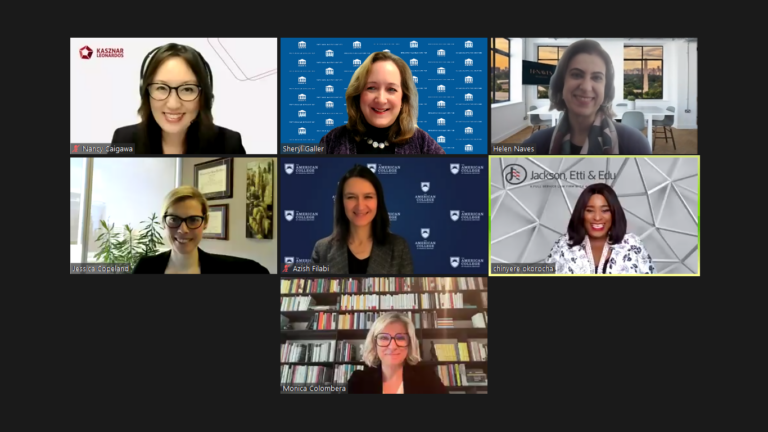New Legal Technology Brings Both Promise and Pitfalls
3.22.2023

Technology has moved us forward, but it’s important not to get left behind. The rise of technology in the legal field provides both opportunities and challenges as systems become both more sophisticated and widespread.
That was the topic of the New York State Bar Association’s Continuing Legal Education course on March 21.
The CLE was sponsored by NYSBA’s Women In Law Section, the International Law Section, the Committee on Law Practice Management, and the Committee on Continuing Legal Education in honor of Women’s History Month and International Women’s Day.
Sheryl Galler, chair of the Women in Law Section, and Helen Naves, senior officer of the International Law Section, moderated the discussion.
The muti-national group of panelists included:
· Helen Naves of HNaves Advogados in São Paulo, Brazil
· Jessica L. Copeland of Bond, Schoeneck & King in Buffalo
· Nancy Satiko Caigawa of Kasznar Leonardos Propriedade Intelectual in São Paulo, Brazil
· Chinyere Okorocha of Jackson, Etti & Edu in Lagos, Nigeria
· Monica Colombera of Legance – Avvocati Associati in Milan, Italy
All panelists agreed that technology had made aspects of their work easier, especially with being able to see remote clients face-to-face. “I assist clients across the country and sometimes internationally,” Copeland said. “So being able to actually see the client instead of just being on an audio teleconference has made a world of difference.”
In addition, technology has enabled “networking across borders” as Okorocha described. “Look at us today.”
Okorocha noted that in Nigeria, the pandemic greatly increased the use of technology. “Covid catapulted us light years ahead,” she said. “There’s a common saying that once you become lovers, it’s difficult to go back to holding hands. So once we tasted the virtual world, there was no going back.”
In 2020, the Supreme Court of Nigeria ruled to allow virtual court hearings and proceedings. In addition, Lagos, where she practices, had gone further and set out guidelines for virtual court hearings.
Also, new tools are being developed to classify documents, find case law, strengthen evidence, and to enable all parties to have access to documents. Some technology, like chatbots to answer rudimentary questions, AI to organize work, and “smart contracts” already exist.
Caigawa said that in Brazil, there is an AI program called Sinapses that screens lawsuits to classify and identify possible legal precedent. “All of that is being developed and it’s an ongoing process of course,” she said. “It was launched in 2021 so we are only at the beginning of the use of such tools.”
She said that between 2009 and 2021, more than 150 million lawsuits were filed electronically in Brazil. This accelerated during the pandemic and led to a backlog. The National Council of Justice of Brazil created a new program to innovate technology, fight corruption, manage data and information, and strengthen the judiciary.
However, technology made by humans still has human faults. “Even in artificial intelligence and even in all these technologies there is the human element.” Galler said. “We’re seeing a lot of stories about bias that is baked into the systems electronically. It’s not as objective as we all hope it would be.”
The panelists agreed that these tools can be used to enhance an attorney’s work, but they cannot replace an attorney or their years of experience. In addition, there are concerns with protecting client information while using free online tools like ChatGPT.
Plus, while technology has enabled workers – especially women – to work anytime and from anywhere, there’s the issue of remote work intruding on personal time. Being available all the time makes it difficult to set boundaries between the office and home.
“I’m a proponent of finding that balance,” Copeland said. “Just because you can work anywhere doesn’t mean you should work from anywhere. There’s an office for a reason.”
The panelists agreed that meeting in person and going to the office is still the best way to learn and establish connections.
“I believe that we can sum up that technology and remote working is an opportunity,” Colombera said at the event’s conclusion. “It is not an alternative way to work.”






